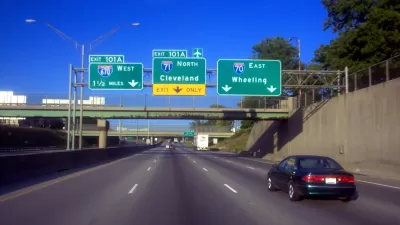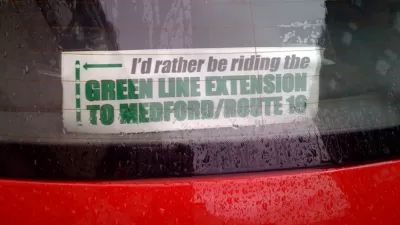Transportation bills are notorious for being chock full of earmarks, and with new attention being brought to curbing them, how will good policy get passed? A handful of experts are discussing the problem over at the National Journal.
Greg Cohen, President and CEO of the American Highway Users Alliance, says it is possible to curb earmarks:
"The prospect of an earmark-free bill could be exciting for transportation stakeholders in that passage of the bill would have to depend on the strength of the bill's policies, rather than the goodies in it for individual districts."
Phineas Baxandall, a Senior Analyst with U.S. PIRG, says that Cong. Jim Oberstar put new controls into effect that could make a difference this time around:
"Under Oberstar's watch, the Committee established rules requiring that earmarked projects have the support of local public officials, a plan for how to fully fund the project, information about the project's benefits, and proof that the member of Congress submitting the request will not benefit financially from the project."
The discussion continues over at the National Journal.
FULL STORY: For the Want of an Earmark

Alabama: Trump Terminates Settlements for Black Communities Harmed By Raw Sewage
Trump deemed the landmark civil rights agreement “illegal DEI and environmental justice policy.”

Planetizen Federal Action Tracker
A weekly monitor of how Trump’s orders and actions are impacting planners and planning in America.

The 120 Year Old Tiny Home Villages That Sheltered San Francisco’s Earthquake Refugees
More than a century ago, San Francisco mobilized to house thousands of residents displaced by the 1906 earthquake. Could their strategy offer a model for the present?

In Both Crashes and Crime, Public Transportation is Far Safer than Driving
Contrary to popular assumptions, public transportation has far lower crash and crime rates than automobile travel. For safer communities, improve and encourage transit travel.

Report: Zoning Reforms Should Complement Nashville’s Ambitious Transit Plan
Without reform, restrictive zoning codes will limit the impact of the city’s planned transit expansion and could exclude some of the residents who depend on transit the most.

Judge Orders Release of Frozen IRA, IIJA Funding
The decision is a victory for environmental groups who charged that freezing funds for critical infrastructure and disaster response programs caused “real and irreparable harm” to communities.
Urban Design for Planners 1: Software Tools
This six-course series explores essential urban design concepts using open source software and equips planners with the tools they need to participate fully in the urban design process.
Planning for Universal Design
Learn the tools for implementing Universal Design in planning regulations.
Clanton & Associates, Inc.
Jessamine County Fiscal Court
Institute for Housing and Urban Development Studies (IHS)
City of Grandview
Harvard GSD Executive Education
Toledo-Lucas County Plan Commissions
Salt Lake City
NYU Wagner Graduate School of Public Service





























